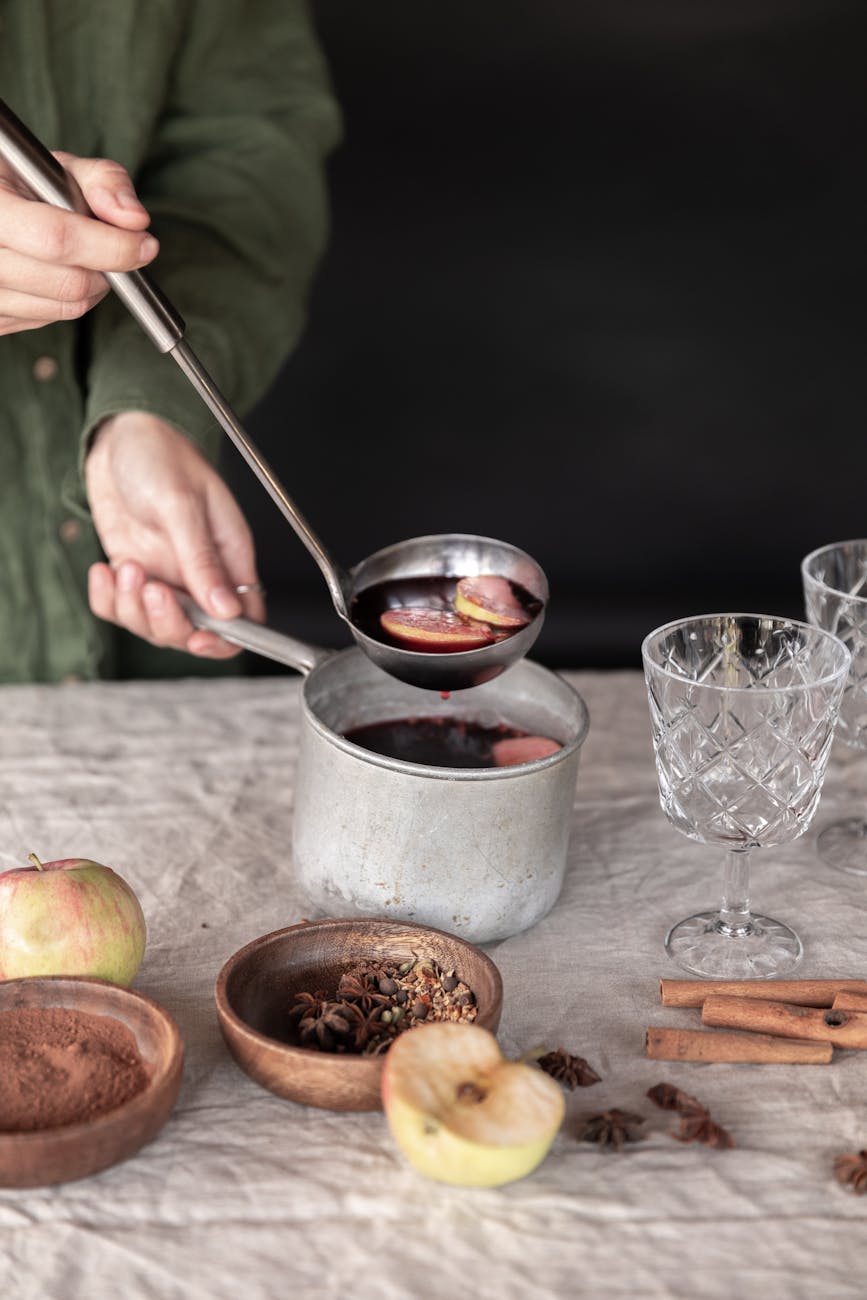There is a peculiar magic in the act of wassailing, a tradition as old as the frost-tipped trees it celebrates. It begins with a toast, a song, a shout. It is a gathering of voices, a clash of cups, a ritual that binds community and nature. Wassailing is not merely drinking; it is storytelling. It is an incantation to the orchard, a plea for the earth to yield her fruit, a promise to see winter through.
Let us wander through the tangled roots of wassailing—its folklore, its curious customs, and its steaming, spiced recipes. And, should you be inspired to host a wassail of your own, know that our shop brims with treasures to bring an extra touch of magic to your celebrations.
What is Wassailing?
Wassailing is both song and ceremony, a tradition that winds through centuries of British history. The word itself comes from the Old English wæs hæl, meaning “be hale” or “be healthy.” It is both greeting and blessing, a toast to good health and fortune.
The practice takes two main forms. There is the wassailing of people, where groups would travel door-to-door, singing for hospitality in exchange for food or drink—an ancestor of carolling. And then there is the wassailing of orchards, a pagan-rooted tradition where people gathered to sing, shout, and pour cider around the trees, awakening the spirits of the orchard to ensure a bountiful harvest.
The Folklore of Wassailing
At its heart, wassailing is about connection: to each other, to the land, and to forces unseen. In orchard wassailing, the trees themselves are honoured as living spirits. Offerings of cider and bread soaked in ale were hung in the branches or poured at the roots. The wassailers—a motley group of villagers, musicians, and merry-makers—would serenade the trees with songs, urging them to bear fruit.
But this was no solemn affair. The songs were boisterous, and the proceedings often included banging pots and pans to frighten away evil spirits. A traditional chant might go:
Here’s to thee, old apple tree,
Whence thou may’st bud, and whence thou may’st blow,
And whence thou may’st bear apples enow!
Hats full! Caps full!
Bushels, bushels, sacks full,
And my pockets full too! Huzzah!It is an act of faith, this noisy midwinter revelry, a reminder that the cold and dark are not forever.
Hosting Your Own Wassail
Wassailing may have ancient roots, but it is far from extinct. Hosting a modern wassail is a wonderful way to brighten the dark days of winter and bring people together. Here’s how:
1. Gather Your Wassail Bowl
Traditionally, a wassail bowl is a communal cup, filled with a steaming, spiced drink. Choose a large, decorative vessel to serve your brew.
2. Prepare Your Drinks
The star of any wassail is the drink itself. Classic wassail is a warm mix of cider, ale, and spices, but non-alcoholic versions made with apple juice are just as delightful.
3. Learn a Song or Two
No wassail is complete without singing. Teach your guests a traditional wassail song (or create your own verses!) to serenade the trees—or your neighbours.
4. Honour the Trees
If you have a garden or orchard, gather around a tree to perform a wassail ceremony. Decorate it with ribbons or pieces of bread soaked in cider as an offering to nature.
Wassail Recipes
Here is a simple yet traditional wassail recipe to warm your gatherings and your spirits:
Traditional Wassail (Serves 6)
Ingredients:
- 1 litre of cider (alcoholic or non-alcoholic)
- 500ml ale (or ginger beer for a non-alcoholic twist)
- 3 apples, cored and studded with cloves
- 2 oranges, sliced
- 4 tbsp honey
- 2 cinnamon sticks
- 1 tsp nutmeg
- 1 tsp allspice
Instructions:
- Preheat your oven to 180°C (350°F). Roast the clove-studded apples until soft (about 20 minutes).
- In a large saucepan, combine the cider, ale, honey, oranges, and spices. Heat gently, but do not boil.
- Add the roasted apples to the mix and simmer for another 10 minutes.
- Serve warm from your wassail bowl, with a ladle to share the cheer.
Wassailing: A Tradition Worth Keeping
Wassailing is more than a quirky winter pastime. It is a celebration of resilience, a joyous rebellion against the cold and dark. It is laughter shared around a fire, the sweetness of cider on your tongue, the hope that the barren trees will bloom again.
So, why not embrace this ancient tradition? Whether you sing to your neighbours, honour your garden, or simply sip a steaming mug of spiced cider, let wassailing remind you that even in the heart of winter, there is warmth to be found.


Leave a Reply